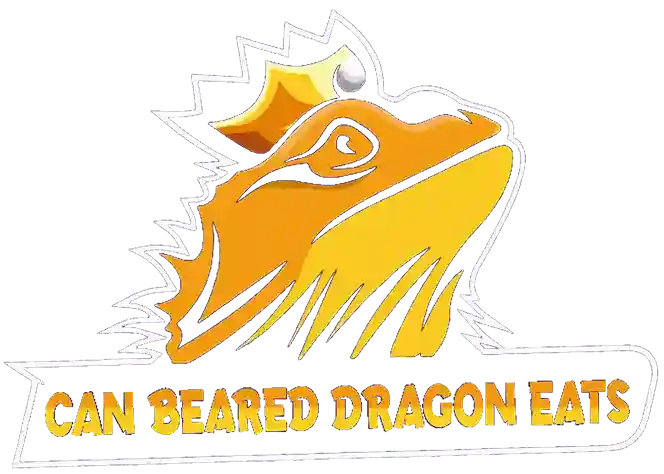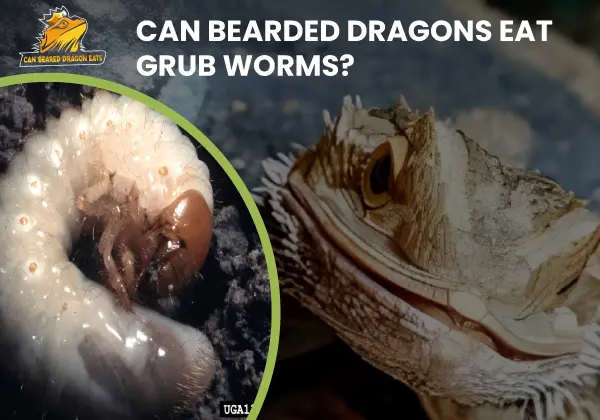“Can Bearded Dragons Eat Grub Worms?” is a common question among reptile enthusiasts. The answer is yes! Bearded dragons can indeed eat grub worms, and they can be a valuable addition to their diet. You can offer grub worms to your bearded dragon as a special treat, providing them with a few worms a couple of times a week
Grub worms, which are essentially beetle larvae, offer a rich protein source along with essential nutrients, making them a healthy treat for your scaly companion. These soft-textured morsels are easy for bearded dragons to digest, making them a convenient and nutritious option.
Let us know the the benefits of including grub worms in your bearded dragon’s diet while emphasizing the importance of portion control for a happy and healthy reptile companion.
Read more : Can bearded dragons eat potatoes?
Why Should You Feed Your Bearded Dragon Grubworms?
Bearded dragons are omnivorous animals that require a balanced diet consisting of vegetables, fruits, and proteins to maintain optimal health. While crickets and other insects are commonly fed to bearded dragons, grubworms can be an excellent source of nutrition for your pet.
Here are some of the nutritional benefits of feeding your bearded dragon grubworms.
High in Protein
Protein is an essential nutrient that helps build and repair tissues and muscles. Grubworms are a rich source of protein, with about 20% of their body weight consisting of protein. Grubworms provide bearded dragon enough protein to maintain healthy muscles and a robust immune system.
Rich in Fat
While too much fat can harm your pet, bearded dragons require some fat in their diet. Grubworms are high in healthy fats that can give your pet the energy they need to stay active and healthy.
Rich in Calcium
Calcium is a crucial nutrient that supports bone health, and bearded dragons require a significant amount of calcium in their diet. Grubworms are rich in calcium, making them an excellent food option for bearded dragons.
High in Moisture Content
Grubworms contain a high percentage of moisture, which can help keep your bearded dragon hydrated. Adequate hydration is essential for proper digestion and avoiding dehydration, which can harm your pet.
Nutritional Value Of Grubworm
According to Healthline, here is a table outlining the nutritional values of grubworms:
| Nutrient | Grub Worms (per 100g) |
| Phosphorus | 206 mg |
| Carbohydrates | 1.7 grams |
| Calcium | 330 mg |
| Protein | 19.6 grams |
| Vitamin A | 1240 IU |
| Vitamin D | 400 IU |
| Vitamin E | 4.55 mg |
| Iron | 2.5mg |
| Fat | 14.7 grams |
Do Grubworms Appeal To The Taste Of Bearded Dragons?
Yes, bearded dragons typically find grubworms appealing to their taste. Grubworms are soft-bodied insects high in protein and fat, making them a tasty and nutritious treat for your pet.
Read more : Can Bearded Dragons Eat Red Clover?
How to Prepare Grubworms for Your Bearded Dragon?
You can prepare grubworm
Here are some tips on how to prepare grub worms for your bearded dragon.
Clean and Rinse
Clean the worms by rinsing them in warm water and removing any excess dirt or debris.
Avoid Pesticides
Avoid feeding your bearded dragon grubworms from your garden or other areas that may have been treated with pesticides or other harmful chemicals. Instead, consider purchasing live grubworms from a reputable pet store to ensure their safety.
Cook or Freeze
To reduce the risk of any parasites or bacteria, consider cooking or freezing the grubworms before feeding them to your pet. You can cook them by boiling or baking them for a few minutes or freezing them for 24 hours.
Feed in Moderation
While grubworms are a nutritious treat, feeding them to your bearded dragon in moderation is essential. Feeding them too often can lead to health problems such as obesity, so ensure that you’re following your vet’s recommended feeding schedule and portion sizes.
How to Feed Grubworms to Your Beardies?
Feeding grubworms to your bearded dragon can be an enjoyable experience for both you and your pet. Here are some tips on how to feed grub worms to your beardies.
Hand-Feeding
Hand-feeding your bearded dragon grubworms can be a great way to bond with your pet and offer them a treat. Hold the grubworm with tongs and offer it to your bearded dragon. Ensure that the worm is small enough for your pet to swallow whole, and avoid overfeeding.
Offer in a Feeding Dish
Another option is to offer the grubworms in a feeding dish. Place the dish in your bearded dragon’s enclosure and allow them to eat the worms at their leisure. This method can be less stressful for your pet and easier for you to monitor their intake.
Rotate with Other Foods
Consider offering your bearded dragon a variety of insects, vegetables, and fruits to keep their diet varied and interesting.
Types of Grubs for Bearded Dragons
Bearded dragons, popular pets known for their unique personalities and dietary habits, can eat various types of grubs. Here are some common grubs that are often included in their diet:
- Dubia Roaches
- Mealworms
- Superworms
- Waxworms
- Silkworms
- Hornworms
- Phoenix Worms (Black Soldier Fly Larvae)
- Butterworms
- Earthworms
How Often Should Bearded Dragons Be Feed Grub Worms?
Bearded dragons should be fed grubworms no more than once a week. Overfeeding grubworms or any other treatment can lead to health issues such as obesity and digestive problems.
EXPERT TIP: Grub worms can be offered as a treat for your bearded dragon, but they should not make up a significant portion of their diet. Offer them once or twice a week, depending on your bearded dragon’s age and dietary needs.
What are the Risks of Feeding Grub Worms to Bearded Dragons?
While grubworms can be a nutritious treat for your bearded dragon, there are some potential risks associated with feeding them.
Here are some of the risks to be aware of.
Parasites and Bacteria
Grubworms can carry parasites and bacteria that can be harmful to your bearded dragon’s health.
Choking Hazard
If the grubworms are too large or not soft enough, they can pose a choking hazard to your bearded dragon. Be sure to offer appropriately sized worms and monitor your pet while they are eating.
Obesity
Overfeeding grubworms or any other treatments can lead to obesity in your bearded dragon.
Allergic Reactions
Some bearded dragons may be allergic to grubworms or other insects. See veterinary attention immediately if you notice any signs of an allergic reaction, such as swelling or difficulty breathing.
EXPERT TIP: Feeding too many grubworms can lead to obesity and other health issues. Monitor your bearded dragon’s weight and adjust its diet accordingly to ensure they maintain a healthy weight.
Where Can You Get Grub Worms for Your Bearded Dragon?
Bearded dragons require a varied diet that includes live insects, and grubworms are a nutritious and protein-packed addition to their diet.
Here are some ways to get grub worms for your bearded dragon:
- Pet Stores: Many pet stores carry live feeders for reptiles, including grubworms. Look for stores that specialize in reptiles or have a dedicated reptile section.
- Online Reptile Supply Stores: You can order grub worms online from reputable reptile supply stores. Be sure to read reviews and check the shipping policies before placing an order.
- Bait Shops: Many bait shops carry grub worms that are safe for reptile consumption. Make sure to ask for grub worms that have yet to be treated with chemicals.
Do Bearded Dragons Eat Grub Worms In The Wild?
Bearded dragons are omnivores, meaning they eat plants and animals. In the wild, they primarily feed on insects but consume other small creatures such as worms, snails, and even small mammals. Grubworms are a common food source for bearded dragons in the wild. Wild bearded dragons have a varied diet and do not rely solely on grubworms for their nutrition.
Can Baby Bearded Dragons Eat Grub Worms?
Baby bearded dragons can eat grubworms as part of their diet. Baby bearded dragons have smaller digestive systems and may not tolerate a large amount of food or a diet high in fat.
Can Baby Bearded Dragons Eat Grub Worms Every Day?
Baby bearded dragons should not be fed grubworms every day. While they are a nutritious treat, overfeeding grubworms or any other food can lead to health problems.
Can Bearded Dragons Eat Grub Worms From the Garden?
Feeding grubworms to bearded dragons from the garden, as they may be contaminated with pesticides or other harmful substances. Grubworms that are commercially raised as feeder insects are a safer option, as they are bred specifically for consumption by reptiles and are raised in a controlled environment.
Can Bearded Dragons Eat Dead Grubworms?
Feeding bearded dragons dead insects, including dead grubworms, is generally not recommended. Dead insects not provide the same level of nutrition as live insects.
What Other Types Of Worms Breaded Dragon Can Eats?
Breaded Dragon can eat worms like Catalpa, Superworms, Red Wigglers, Red Worms, Wax Worms, and Earthworms.
Read more : Can bearded dragons eat pears?
FAQS
Can Bearded Dragons Eat Wild-Caught Grub Worms?
It’s generally not recommended to feed wild-caught grubworms to bearded dragons as they may be exposed to pesticides or other harmful chemicals. Obtaining grubworms from a reputable source or breeding them yourself is best.
How Should You Store Live Grub Worms?
Live grubworms should be stored in a cool, dark place like a refrigerator to keep them alive and fresh. Make sure to keep them in a well-ventilated container with holes in the lid to prevent suffocation. Feeding and changing their bedding regularly is important to keep them healthy.
Final Words For Can Bearded Dragons Eat Grub Worms?
Grubworms can be a nutritious and delicious addition to a bearded dragon’s diet. It’s crucial to prepare and feed the worms correctly and only to obtain them from reputable sources.
If you’re considering adding grub worms to your bearded dragon’s diet, it’s essential to consult with a veterinarian or experienced reptile owner for advice on feeding and care. Remember, a varied diet that includes different types of insects and fresh produce is essential to your pet’s health and well-being.
- Eastern Bearded Dragon - July 26, 2024
- Why Do Bearded Dragons Bob Their Heads? - July 25, 2024
- Everything You Need to Know About Paradox Bearded Dragons - July 10, 2024

